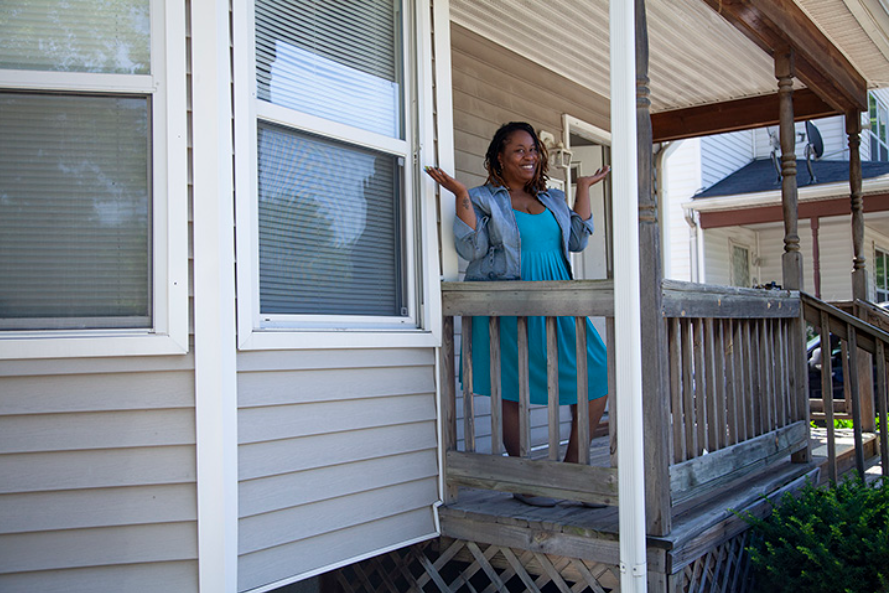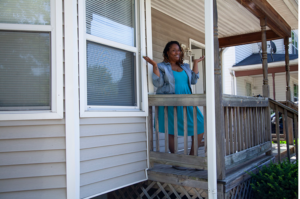Source: Public Affairs

Candace Sims, a homeowner in the Newberry neighborhood. Photo courtesy of MiSide.

Candace Sims, a homeowner in the Newberry neighborhood. Photo courtesy of MiSide.
For two decades, no one took out a new mortgage to buy a home in or around an eight-block area of Detroit’s Chadsey-Condon neighborhood.
Then, a unique lending program launched by a nonprofit agency helped dozens of renters there become successful homeowners.
Researchers from the University of Michigan plan to study the program as they explore the gaps around mortgage availability and home ownership in Detroit, as well as some of the challenges faced by borrowers of color.
The project is funded through a $330,000 grant from the U.S. Department of Housing and Urban Development. It could have implications across the city and beyond, said project coordinator Michael Kloc, who is part of the research team from the School of Social Work’s Center for Equitable Family & Community Well-Being.
“What I’m hoping is that we can tell a story on a national scale about incredible people who live in Detroit, that through no fault of their own, have been impacted by systems of racism and oppression, and how if we strategically fund projects that allow folks who normally wouldn’t be able to obtain home ownership within our traditional economy to become homeowners, it is beneficial for everyone,” he said.
MiSide, a Detroit-based nonprofit formerly known as Southwest Solutions, is partnering with U-M on the project.
The researchers will focus on two areas of the city: the University Grove development in the Harmony Village neighborhood and a section of Chadsey-Condon known as Newberry Homes.
Both have residences that were formerly part of a low-income tax credit program that offers incentives to developers who build affordable housing. But in Newberry, MiSide used a $2.5 million gift from philanthropist Judith Yaker to acquire 60 single-family rental properties in 2018 after the tax credit expired.
The nonprofit’s lending arm created a special mortgage product, using the donation as the loan pool, to offer a competitive interest rate and more favorable underwriting guidelines to help tenants purchase their homes. Tenants also had access to up to $20,000 in down payment assistance, financial counseling and funding for some repairs.
To date, 53 Newberry properties have been purchased. Even with taxes and insurance, the monthly mortgage payments are generally far less than what the households had been paying in rent.
Many of the tenants-turned-homeowners wouldn’t have been able to qualify for a traditional mortgage, said Patrick Meehan, program manager at the Center for Equitable Family & Community Well-Being. Credit history and the old age of the city’s housing stock have traditionally served as barriers to mortgage financing for borrowers of color in Detroit, he said.
“One thing we’re hoping to reveal from this project is that these are all responsible homeowners who have made regular payments on their mortgages – they’re not in arrears in any way,” he said. “This is a pool of potential homeowners that traditional financing has largely missed in the way it operates in the city of Detroit.”
The researchers will explore how the special mortgage financing – or lack thereof – impacted the attainability of home ownership for borrowers of color in the two neighborhoods. They’ll also look at how borrowers of color perceive their relationship to credit, among other topics.
Trina Shanks, a professor of social work, the director of the Center for Equitable Family & Community Well-Being and the principal investigator on the project, said she expects the research to show that with an affordable mortgage program and other support, low-income, vulnerable families can be just as successful at home ownership as others.
The research team hopes to conduct 80 interviews with current and former residents of Chadsey-Condon and University Grove. They also plan to review data from the Home Mortgage Disclosure Act and other sources.
Owning a home can have a significant, positive long-term impact on families, said Alex Makohn, senior manager of homeownership assistance programs for MiSide.
“To have ownership is to create stability for that family,” she said. “You don’t have to worry about rents going up, or having to move from place to place. Children can stay at the same school.”
Makohn also said when there’s an ability to “get a little more innovative and flexible” with mortgage underwriting guidelines, home ownership can be more successful and sustainable over time.
The research project was one of only three nationwide to receive funding as part of a U.S. Department of Housing and Urban Development initiative aimed at addressing the disparities that exist for borrowers of color and other underserved groups.
Ultimately, the researchers hope lenders and policymakers take notice.
“If (the special mortgage program) could be replicated in other parts of the city, other parts of the country,” Meehan said, “there could be greater access to home ownership for a wider pool of potential homeowners, and greater wealth accumulation among these homeowners.”

